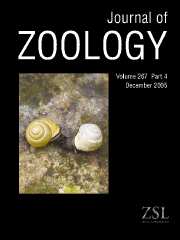Article contents
Mass loss during the mating season in male common brushtail possums (Trichosurus vulpecula): implications for age-specific variation in mating strategy
Published online by Cambridge University Press: 18 May 2005
Abstract
Little is known of patterns of male reproductive effort and investment, and their relationship with age-related differences in male mating strategy, in mammals. In this study, the age-specific patterns of reproductive expenditure in a male marsupial, the common brushtail possum Trichosurus vulpecula were investigated. Possums were studied for two breeding seasons on Magnetic Island, north Queensland, Australia. Energy expenditure in male possums during the mating season was estimated from changes in mass taken monthly during live-trapping. Male possums lost an average of 4.2% of their mass during the main mating season from January to May, suggesting that mating and consort behaviour is energetically expensive and may constrain foraging activity. The percentage of body mass lost by individual males during the breeding season was negatively related to age; older males directed less somatic investment into reproduction than young males. Older males seemed to target their energy expenditure toward the period when oestrus synchrony was highest. The pattern of age-specific energy expenditure for reproduction in T. vulpecula differs markedly from that reported previously for male cervids, probably owing to the spatial dispersal of females leading to differences in mating strategy. The results are discussed in terms of their relevance to potential age-related differences in reproductive strategy and behaviour.
- Type
- Research Article
- Information
- Copyright
- 2005 The Zoological Society of London
- 8
- Cited by




